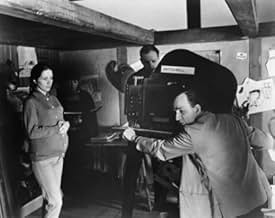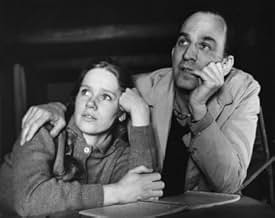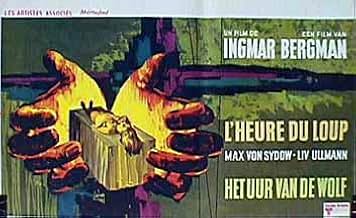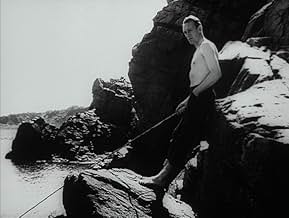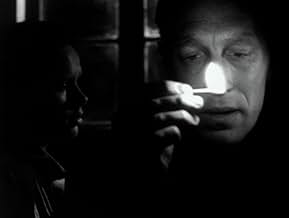PUNTUACIÓN EN IMDb
7,5/10
23 mil
TU PUNTUACIÓN
Un artista que pasa sus vacaciones en una remota isla escandinava junto a su joven esposa embarazada sufre una crisis emocional al tratar de enfrentarse a sus deseos reprimidos.Un artista que pasa sus vacaciones en una remota isla escandinava junto a su joven esposa embarazada sufre una crisis emocional al tratar de enfrentarse a sus deseos reprimidos.Un artista que pasa sus vacaciones en una remota isla escandinava junto a su joven esposa embarazada sufre una crisis emocional al tratar de enfrentarse a sus deseos reprimidos.
- Premios
- 2 premios en total
Agda Helin
- von Merken's Maid
- (sin acreditar)
Lenn Hjortzberg
- Kreisler
- (sin acreditar)
Mikael Rundquist
- Boy in Dream
- (sin acreditar)
Folke Sundquist
- Tamino
- (sin acreditar)
Argumento
¿Sabías que...?
- CuriosidadesIngmar Bergman originally penned the script in 1964 under the title "The Cannibals". A serious bout of pneumonia led him to reconsider the project whilst lying in hospital; he deemed it to be potentially too expensive in concept and execution. Bergman revised the script idea into a more low budget piece to accompany Persona (1966).
- Versiones alternativasThere exists an earlier version of the film with an additional, meta-cinematic framing device. In the prologue (lasting about 7 minutes), Bergman is seen on the set directing his actors. The epilogue (lasting about 1 minute) shows us the set being torn down and the crew leaving. These sequences are the only differences to the commonly seen version. Bergman has stated in an interview that he cut off these sequences himself before the general release of the film, as he came to the conclusion that they were just "self-deception". Despite this, a Swedish 35 mm print of the original, longer version does exist, although it's not available on home video in any format.
- ConexionesEdited into 365 days, also known as a Year (2019)
Reseña destacada
This seems to be one that divides fans of the master, but I loved it. It's easy to see why people see this as being a bit of an odd-one-out in Bergman's output: it's very direct in it's depiction of disturbed states of mind, directly illustrating hallucinatory states rather than just hinting at them. Others have pointed to references to other films of the horror genre, which seem undeniable.
Not that you'd mistake this for a film by anyone but Bergman. It's rich in connections with other of his films and autobiographical references (such as the terrifying description of being locked in a cupboard as a child). It can be reasonably thought of as Bergman's 'horror film' but he takes on the genre very much on his own terms.
It's a film that lingers long in the mind, with many unforgettable scenes (including the amazing Magic Flute scene) aided by Sven Nykvist's wonderful chiaroscuro photography. The use of music is (as ever with Bergman, the most musical of directors) extremely intelligent: the scene with the boy is set apart from the rest as much by the music as the photography.
Given the quality of the cast, you'd expect superb performances. As ever, von Sydow and Ullmann are excellent, with equally good supporting performances.
At times I was reminded of Rilke's only novel, The Notebook of Malte Laurids Brigge. If you don't know this, I urge you to seek out a copy: there's a distinctly Bergmanesque atmosphere to the whole work, but there are specific images that seem to link to this film.
This is a film that repays repeated viewings. Despite it's extremely disturbing subject matter, to me it's not as emotionally draining as many of Bergman's other films (such as Shame or Winter Light), in spite of (or perhaps because of) the visual horrors on display. Still, I recommend it very highly.
Not that you'd mistake this for a film by anyone but Bergman. It's rich in connections with other of his films and autobiographical references (such as the terrifying description of being locked in a cupboard as a child). It can be reasonably thought of as Bergman's 'horror film' but he takes on the genre very much on his own terms.
It's a film that lingers long in the mind, with many unforgettable scenes (including the amazing Magic Flute scene) aided by Sven Nykvist's wonderful chiaroscuro photography. The use of music is (as ever with Bergman, the most musical of directors) extremely intelligent: the scene with the boy is set apart from the rest as much by the music as the photography.
Given the quality of the cast, you'd expect superb performances. As ever, von Sydow and Ullmann are excellent, with equally good supporting performances.
At times I was reminded of Rilke's only novel, The Notebook of Malte Laurids Brigge. If you don't know this, I urge you to seek out a copy: there's a distinctly Bergmanesque atmosphere to the whole work, but there are specific images that seem to link to this film.
This is a film that repays repeated viewings. Despite it's extremely disturbing subject matter, to me it's not as emotionally draining as many of Bergman's other films (such as Shame or Winter Light), in spite of (or perhaps because of) the visual horrors on display. Still, I recommend it very highly.
- neil-313
- 29 jul 2005
- Enlace permanente
Selecciones populares
Inicia sesión para calificar y añadir a tu lista para recibir recomendaciones personalizadas
- How long is Hour of the Wolf?Con tecnología de Alexa
Detalles
- Fecha de lanzamiento
- País de origen
- Idiomas
- Títulos en diferentes países
- Hour of the Wolf
- Localizaciones del rodaje
- Empresas productoras
- Ver más compañías en los créditos en IMDbPro
- Duración1 hora 28 minutos
- Color
- Mezcla de sonido
- Relación de aspecto
- 1.37 : 1
Contribuir a esta página
Sugerir un cambio o añadir el contenido que falta

Principal laguna de datos
By what name was La hora del lobo (1968) officially released in India in English?
Responde

